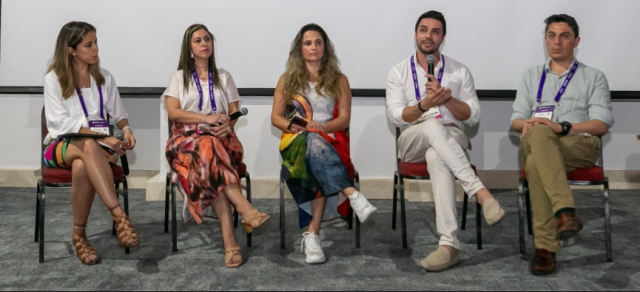
During the afternoon of the first day of Andicom, the Ministry of ICT led the panel ‘AI Impact: Boosting Your Company Towards Competitiveness’, where representatives from sectors such as health, agriculture, and real estate shared their perspectives on the advancements of Artificial Intelligence in these fields.
The participants highlighted the need for teamwork, bringing together different ecosystems to enhance the well-being of families through the adoption of technological tools in daily life. Successful cases in HealthTech, PropTech, and Agrotech were also presented, as well as the Ministry of ICT’s commitment to artificial intelligence, aiming to democratize this cutting-edge technology across all regions.
In the tech sector, innovation ecosystems play a crucial role in territorial development. They are a pillar of the Ministry of ICT’s strategy to become a Digital Powerhouse, a key topic addressed by the ministry at Andicom 2024. During the ‘AI Impact: Boosting Your Company Towards Competitiveness’ panel, progress was shared regarding the consolidation of technological arenas—economic sectors the government will strengthen with ICT to contribute to family welfare. It was also concluded that technological tools must ease citizens’ lives.
The panel on innovation ecosystems, moderated by María Lucía Flórez, Director of Digital Economy at the Ministry of ICT, featured participants such as Lina Morales, Project Manager of HealthTech Colombia Association; Shirley Sánchez, President of Colombia PropTech; Sergio Zúñiga, Regional VP Latam at Eatable Adventures; and Juan Miguel Gallego, Artificial Intelligence Advisor at the Ministry of ICT.
“It is crucial to educate from the ground up and infuse the industry with an innovation culture. We must continue working together with all actors to dispel myths and overcome the fears brought on by digital advancements, particularly artificial intelligence,” emphasized María Lucía Flórez during the session, which highlighted both present and future challenges in strengthening technological adoption.
Shirley Sánchez emphasized the physical barriers, especially in housing, and the need to educate communities to overcome these limitations. Lina Morales, Project Manager at HealthTech Colombia Association, spoke about the need to understand how technology can be integrated into traditional sectors like healthcare, where adopting new tools is particularly challenging due to resistance to change.
Sergio Zúñiga, an expert in the agricultural sector, stressed the importance of enabling innovation platforms in other government agencies. A notable example was a program they led in Cambodia, where farmers could detect issues in their crops through a chatbot, representing a complete disruption in food production. Similar initiatives are being implemented in Colombia’s agricultural sector with innovative ideas that align with the market.
“Despite technological advancements, the gap in adoption is widening due to the regulatory pace. It is crucial to mitigate this effect, as a dynamic market influences business decision-making. From public policy, we want to address these issues and provide clear market signals,” said Juan Miguel Gallego, Artificial Intelligence Advisor at the Ministry of ICT.
Colombia’s tech ecosystem is in constant interaction with various actors, and today, digital transformation is at the center of the government’s agenda. Different sectors and ecosystems view this focus positively, recognizing that each component plays a fundamental role in the commitment to continue adding enablers that align with territorial competitiveness.
At the end of the panel, key factors for strengthening the adoption of new technologies were emphasized. The sophistication of solutions, digital entrepreneurship, internationalization, the creation of technological ecosystems, and a commitment to sustainability and innovation are all tools the country is currently working on to make Colombia a Digital Powerhouse. Additionally, the public policy on artificial intelligence will serve as the roadmap to address the challenges and innovations that come with everyday life and technological advancements.




